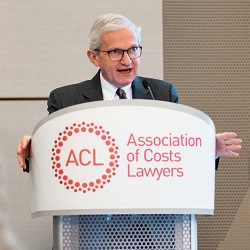
Vos: Crossover with review of Solicitors Act
The Civil Justice Council’s (CJC) litigation funding working group published its interim report yesterday, taking on issues ranging from regulation of third-party funders to the collapse of SSB Law.
The report and consultation contain no conclusions, and give very little sense of the group’s thinking, although it indicates concerns about the adequacy of the Association of Litigation Funders’ (ALF) code of conduct, the lack of control over what funders take from damages, and whether before-the-event (BTE) legal expenses insurance could have more of a role in funding litigation.
The wide-ranging review, co-chaired by Dr John Sorabji and Mr Justice Simon Picken, was commissioned earlier this year by the Conservative Lord Chancellor Alex Chalk, as an adjunct to efforts to reverse last year’s Supreme Court ruling in PACCAR.
The consultation period closes on 31 January and the final report will be delivered next summer. The new government has indicated that it will not take forward legislation over PACCAR until it has seen the report.
Among the topics it covers are whether and how regulation of third-party funding should be introduced, caps on funders’ returns, provisions to protect claimants, and the role of other types of litigation funding.
It was estimated in 2021 that 44 funders operated in England and Wales. ALF, a voluntary self-regulator, has 16 members, of which eight are also members of the International Litigation Funders Association (ILFA), a representative body.
On the ALF code of conduct, the review said: “In so far as the potential fine for misconduct is concerned, it could be questioned whether a £500 limit is able to provide a sufficient deterrent. It could also be questioned whether there should be a provision for awarding compensation for loss, so as to avoid further satellite litigation.”
It observed that ILFA’s best practice requirements and the European Association of Litigation Funders’ code of conduct go further than ALF’s in having conflict of interest rules and requirements on the information funded parties should receive, while the latter also specified the minimum content of funding agreements.
But the review pointed out that the funded party was always represented by regulated lawyers.
“It is important therefore to bear in mind the role and efficacy of the professional obligations placed on a funded party’s advisers to advise them properly concerning the nature of any proposed TPF agreement and the availability, advantages and disadvantages of it and other funding methods.”
Recent government policy, it went on, was “to seek to avoid unnecessary formal regulation if acceptable alternatives exist”.
On the costs of funding, the review said: “It might be said with some force that, if society expects legal costs to be controlled by standards and limitations of recovery enforced by the courts (through rules based regulation (i.e. CPR) or statutory controls (i.e. Solicitors Act 1974)), then there may be a legitimate expectation that standards and limitations be imposed on the costs of financing the very claims in which the costs are controlled.
“This may be all the more compelling where the finance costs greatly exceed by many multiples of the litigation costs incurred.” There is some control in collective actions in the Competition Appeal Tribunal.
There was also “possibly something in the argument that 10 years on since the Jackson reforms a re-evaluation of the issue of recovery of funding costs is justified”, the review said.
The working party said it was keen to receive evidence on the operation of the BTE market, including views on a suggestion in Canada that it “be promoted as an effective replacement of civil legal aid and that this be achieved by the introduction of a mandatory, publicly administered LEI scheme”.
It explained: “The rationale for making the scheme mandatory would be to ensure that the whole population would have access to the scheme and that it would have as diverse a risk profile as possible. Hence premiums would be capable of being as low as possible.
“Such a scheme would need, however, to consider how payment of premiums could be effected for individuals who were, for instance, on various forms of income support.”
It also called for evidence on the operation of conditional fee and damages-based agreements, and whether it might be beneficial to move to a single regulatory regime that encompassed all forms of contingent funding agreements.
The role and possible regulation of crowdfunding will also be examined.
The working group considered the collapse of SSB Law – owing around £200m to six third-party funders – in the context of portfolio funding.
“This particular case raises questions concerning compliance by funded parties’ legal advisers with their professional regulatory obligations. The working group is particularly keen on receiving evidence concerning the role that professional regulation has where litigation funding generally, and portfolio funding specifically, is concerned.”
The review acknowledged the wider questions of effective consumer protection that SSB raised and that “care needs to be taken not to generalise from single examples”.
It went on: “It may be an outlier, but equally it may be indicative of wider problems, market failure in portfolio funding or a failure in effective legal services regulation.”
Welcoming publication of the report, Sir Geoffrey Vos, Master of the Rolls and chair of the CJC, said the council was also conducting a review of the Solicitors Act 1974, through a working group chaired by Mr Justice Adam Johnson.
“The CJC understands that there will be areas of overlap between the work of that group and the litigation funding group.
“It will create valuable consistency and coherence for the Solicitors Act working group to be able to take account of the responses to this consultation by the litigation funding group as they take forward their work in the new year.”














Leave a Comment